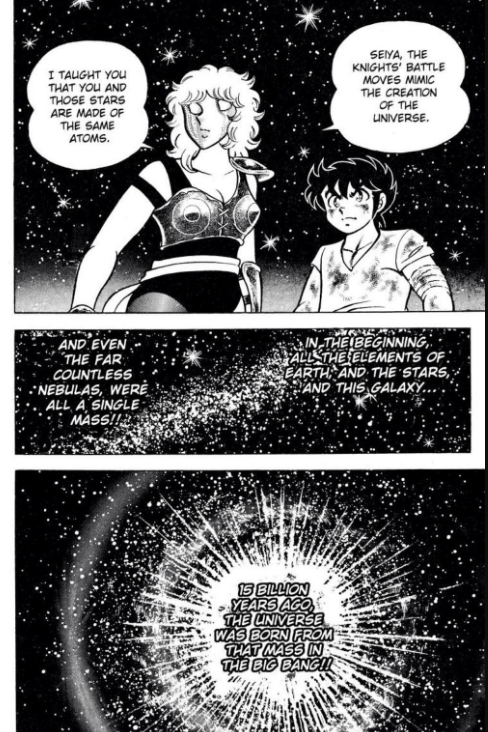Which you've painfully misinterpreted, your own translators don't even support your interpretation.
They don't support or go against any interpretation, just a neutral confirmation that it could be either or, already discernible from the Japanese dictionaries that cover this word.
be more specific, which series?
Saint Seiya.
Which part? The only other relevant information there is about some stuff in Next Dimension, which has already been addressed above as simply being time travel portals.
Athena was stated to be "
Coming from a far away spacetime."
[10] We also learned in the far more recent chapter, far later into the story, that the Timeline of
"The Past," "The Present," and "The Future" are different timelines.
[13] In that same panel/page, it is also mentioned that Athena is "traversing time and space."
[13] She is crossing one timeline (Spacetime continuum) into another Timeline (Spacetime Continuum). This sentence implies that there is a higher dimensional spatial and temporal axis that encompasses the multiverse thus implying the structure of "The Universe" without stating it.
[10] says that she's coming from across space-time, in reference to her time travelling to the past.
[13] 時間軸 means timeline in the sense of a time axis (if you look this phrase up, time axis is what it tends to come up). And the context of this is time being dilated between past present future (some contrived plot device to raise the stakes), not that they're literally different timelines.
The nebulae in Chronos Lake that Saori sees are different parts of the timeline (hence the entire plot of changing the past to change the present), hence why they even make up past present future together, which wouldn't be the case if they were somehow their own timelines.
Speaking of the structure of "the universe" in Kurumada's work, this was literally explained in Chapter 1.
Extremely self explanatory. The universe was created from an explosion of condensed matter. This is the most standard, traditional usage of universe ever, as is the case in pretty much all fiction.
The term universe is utterly redundant in this interpretation, however, Okada distinguishes the two terms and never in the history of G from this scan on are "universes" and "parallel worlds"/"dimensions" ever used interchangeably with the "universe" always being treated as a larger object either literally or in ambition as pertaining to a characters goal(s).
Universe here was in reference to the makeup of the world (context is Shura noticing his world and the world he came are similar while having different futures at some point), and parallel world is used to define similar worlds that end up with different futures.
Okada has even acknowledged a universe, a world, and the multiverse, as their own things.
Notice how world>universe (the world is the timeline, the universe seems to be what makes it up), and world on its own is still very blatantly in reference to singular timelines in these scene, or in other words, singular universes. Dang, universe means universe after all.
And on the topic of redundancy, what's truly redundant is the notion that "the universe" refers to the multiverse, yet distinguishing them like this in a scene like this with multiverse being >universe (yes, it says Multiverse singular here and there's no case for plural ambiguity, as Okada actually took the trouble to spell out
マルチバース the English word Multiverse in katakana). Or equally redundant is the notion that "worlds" exists as a subset of the "universe" within it, in light of the above scene where it's not only distinguished, but listed as a step up as the scale escalates from universe-->world-->multiverse.
At any rate, this is how Shura's dialogue reads verbatim:
"There isn't necessarily only one world. There may also be worlds that have the same universe but lead into different futures---- a different parallel world." There isn't a distinction being made, this is him labelling it a parallel world.
so I've noticed you've called my side out for using "circular logic" and yet, when asked for you layout the logic path and demonstrate its circular you just repeated your last 3 comments with extra word salad. Prove we're using circular logic.
In actuality, you don't have an argument, you have incredulity and a linguistically inconsistent interpretation of what is actually a very simple statement.
What exactly am I supposed to lay out when your "point" literally has no sort of elaboration or citation? I literally just said above whatever
gets cited won't amount to more than that, because there is no scene that indicates "universe" refers to anything more than what the word means, it's really not that complicated. As for the points in the blog, they were mostly misinterpretations stemming from left out context.
No, I've pointed out multiple tangible contextual contradictions to such an interpretation which aren't being properly addressed at all. What's actually simple is the fact that universe means universe, has always meant universe, and has never been redefined to somehow not mean universe.





